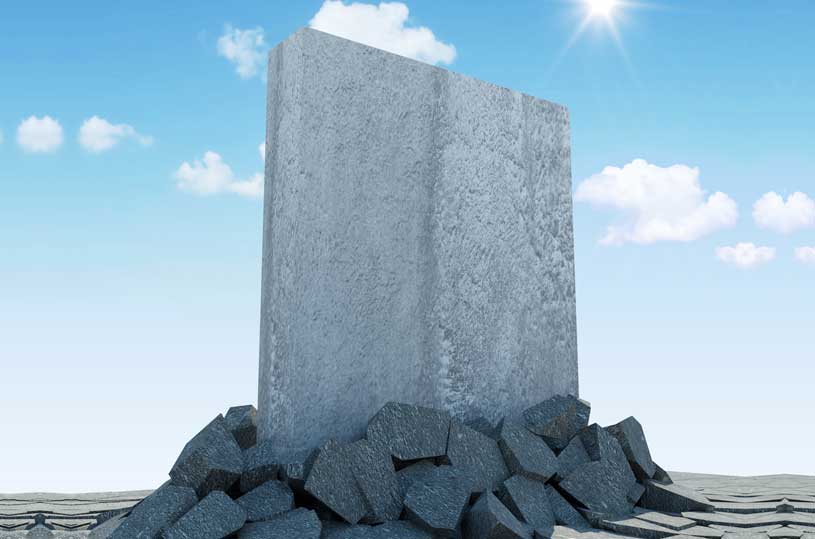In the midst of the devastating tochachah, HaShem comforts us, saying: “And I will remember My covenant with Yaakov, and even My covenant with Yitzchak, and even My covenant with Avraham I will remember.”[1] The obvious question here is, why are the Avos mentioned in reverse order? Rashi, quoting Toras Kohanim, explains that the merit of Yaakov, the “smallest” of the Avos, should suffice, but if it does not, then Yitzchak’s merit should, and if even that is not enough, then Avraham’s great merit will surely be sufficient.[2] Thus, Yaakov is mentioned first because the Avos are mentioned in ascending order of merit.[3]
The problem with this explanation is that Chazal tell us that Yaakov was the greatest of the Avos, the only one whose progeny was completely righteous, whereas Avraham and Yitzchak had descendants unworthy of being part of the Jewish people. Accordingly, how can we understand that Yaakov’s merit in redeeming the Jewish people from its suffering is weaker than that of Avraham and Yitzchak? We also need to explain why Avraham is considered greater than Yitzchak in this context.
It seems that the fact that Yaakov may have been the most perfect of the Avos in terms of middos does not necessarily mean he had the greatest merit. Merit is derived from achievement in relation to the difficulty of one’s task. While Yaakov reached the highest level of the Avos, he may have had an easier task than his great predecessors. How was Yaakov’s task easier than that of Yitzchak, and Yitzchak’s easier than Avraham’s? Avraham was born into a world of avodah zarah. His great challenge was to create from nothing a whole new outlook and way of life, to begin a new epoch in history.[4] Doing so constituted an incredible test, because he had to fight against all the prevalent attitudes and lifestyles and begin something on a very lowly scale and slowly and patiently develop it. Yitzchak was born into a world in which the new outlook had already been created; he did not need to innovate an approach. However, Rav Mattisyahu Salomon, shlita, writes that Yitzchak did have to introduce one thing: the concept of mesorah, that a son faithfully follows the guidelines received by his father.[5] Yaakov, in contrast, did not have to begin a new religion or the concept of tradition. He clearly faced great challenges, but in this regard he seems to have had an easier task than his forebears. Thus, although Yaakov was the greatest of the Avos, his merit in redeeming the people from suffering is less.[6]
Rav Salamon speaks at length about how one of Avraham Avinu’s main strengths was his power of hischadshus, his ability to innovate.[7] He notes that in describing Avraham’s contribution to the world, Rambam uses the word maschil (beginner) no fewer than five times in quick succession.[8] Rav Salamon writes that “Avraham was a maschil, a person who began things. He was a revolutionary, a pioneer, he was the originator and founder of the Jewish people. Avraham was the first in everything he did. He had no father that he could follow, and thus, he was always breaking new ground.”[9] When trying to emulate Avraham, we traditionally strive to learn from his great chesed. We see from here that his initiative is also a quality worth developing.
The Kli Yakar also places great emphasis on the greatness of hischadshus. In Bereishis, the Torah describes each day of Creation as “good” (or “very good,” in the case of Shabbos) – except the second day. A number of explanations are given as to this anomaly. The Kli Yakar writes that nothing completely new was created on the second day; therefore, it cannot be described as good.[10] It is apparent from this interpretation that goodness is associated with newness.
Innovation is important in our lives in several ways. It is natural for a person to get into a habit with regard to many aspects of his life, including his growth in Torah, his relationships, and his ability to create and build. Occasionally it is beneficial to step back and assess whether a new approach is called for. New approaches often provide alternative ways of dealing with situations and can meet with great success. An example is given by a leading educator in the area of shalom bayis. A woman highly dissatisfied with her husband decided that she wanted a divorce. This educator suggested that before taking such a drastic step, she should try a new approach, focusing completely on her own behavior and striving to be the best wife possible. Shortly after following this instruction, she saw a major change in her husband. Her willingness to try a new tack was the key to a huge improvement in her marriage.
One of the most important areas in which hahischadshus is vital is the creation and development of ideas, movements, or organizations that can provide great benefit to Klal Yisrael. For instance, Sarah Shenirer, a”h, envisioned formal Jewish education for women. Her idea was so revolutionary that it met with great opposition. Nonetheless, she persevered and ultimately had an incredible effect on the Jewish people. In addition to taking on a new approach, it is essential to see it through despite the challenges one may face.
Another proof that beginnings can be very beneficial is their difficulty. “All beginnings are difficult,” say Chazal.[11] Precisely because a new start can be so powerful, the yetzer hara makes it very difficult to push through with one.
Avraham Avinu may not be described as the “greatest” of the Avos, but in the area of hischadshus he certainly leads the way. May we all learn from him and make successful new beginnings when necessary.
Notes and Sources
[1] Vayikra 26:42.
[2] Rashi ad loc.; Toras Kohanim 26:49.
[3] See Maskil l’David 24:42; Rav Yaakov m’Lisa (author of Chavos Daas and Nesivos HaMishpat), quoted in B’Shem Omro.
[4] Indeed the Gemara (Avodah Zarah 9a) divides Jewish history into three epochs of two thousand years each, and the second of these eras – that of Torah – begins with Avraham‘s efforts at spreading Torah throughout the world.
[5] Rav Mattisyahu Salomon, shlita, Matnos Chaim, p. 30.
[6] Of course, Yaakov also faced great challenges. We are merely positing that in the area of hischadshus, his task was easier than Avraham’s and Yitzchak’s.
[7] Matnos Chaim, p. 29.
[8] Rambam, Hilchos Avodas Kochavim 1:3.
[9] Matnos Chaim, pp. 29–30.
[10] Kli Yakar, Bereishis 1:8.





